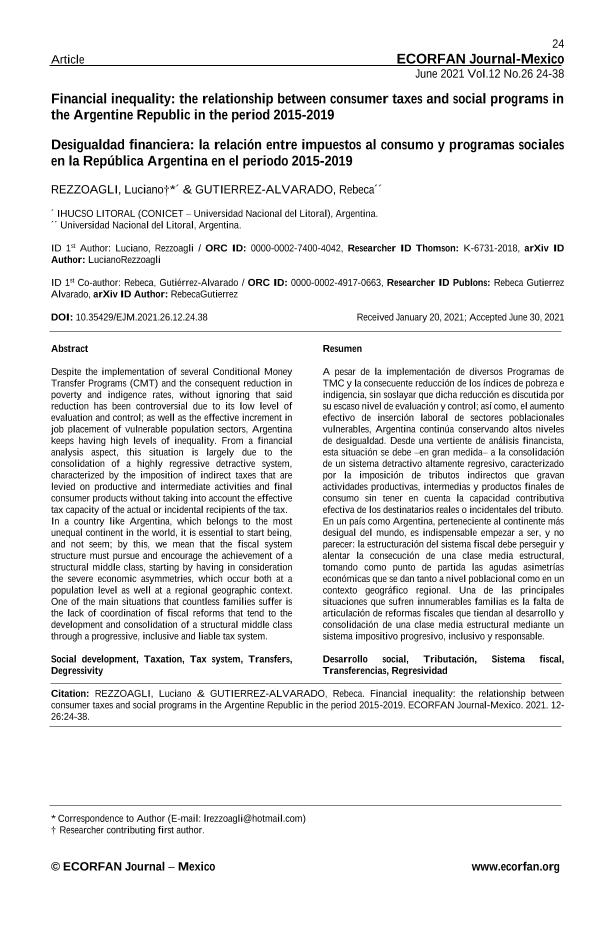Artículo
Despite the implementation of several Conditional Money Transfer Programs (CMT) and the consequent reduction in poverty and indigence rates, without ignoring that said reduction has been controversial due to its low level of evaluation and control; as well as the effective increment in job placement of vulnerable population sectors, Argentina keeps having high levels of inequality. From a financial analysis aspect, this situation is largely due to the consolidation of a highly regressive detractive system, characterized by the imposition of indirect taxes that are levied on productive and intermediate activities and final consumer products without taking into account the effective tax capacity of the actual or incidental recipients of the tax. In a country like Argentina, which belongs to the most unequal continent in the world, it is essential to start being, and not seem; by this, we mean that the fiscal system structure must pursue and encourage the achievement of a structural middle class, starting by having in consideration the severe economic asymmetries, which occur both at a population level as well at a regional geographic context. One of the main situations that countless families suffer is the lack of coordination of fiscal reforms that tend to the development and consolidation of a structural middle class through a progressive, inclusive and liable tax system. A pesar de la implementación de diversos Programas de TMC y la consecuente reducción de los índices de pobreza e indigencia, sin soslayar que dicha reducción es discutida por su escaso nivel de evaluación y control; así como, el aumento efectivo de inserción laboral de sectores poblacionales vulnerables, Argentina continúa conservando altos niveles de desigualdad. Desde una vertiente de análisis financista, esta situación se debe –en gran medida– a la consolidación de un sistema detractivo altamente regresivo, caracterizado por la imposición de tributos indirectos que gravan actividades productivas, intermedias y productos finales de consumo sin tener en cuenta la capacidad contributiva efectiva de los destinatarios reales o incidentales del tributo. En un país como Argentina, perteneciente al continente más desigual del mundo, es indispensable empezar a ser, y no parecer: la estructuración del sistema fiscal debe perseguir y alentar la consecución de una clase media estructural, tomando como punto de partida las agudas asimetrías económicas que se dan tanto a nivel poblacional como en un contexto geográfico regional. Una de las principales situaciones que sufren innumerables familias es la falta de articulación de reformas fiscales que tiendan al desarrollo y consolidación de una clase media estructural mediante un sistema impositivo progresivo, inclusivo y responsable.
Financial inequality: The relationship between consumer taxes and social programs in the Argentine Republic in the period 2015-2019
Título:
Desigualdad financiera: La relación entre impuestos al consumo y programas sociales en la República Argentina en el periodo 2015-2019
Fecha de publicación:
04/2021
Editorial:
Ecorfan
Revista:
Ecorfan Journal
ISSN:
2007-1582
e-ISSN:
2007-3682
Idioma:
Inglés
Tipo de recurso:
Artículo publicado
Clasificación temática:
Resumen
Palabras clave:
Social development
,
Taxation
,
Tax system
,
Degressivity
Archivos asociados
Licencia
Identificadores
Colecciones
Articulos(IHUCSO LITORAL)
Articulos de INSTITUTO DE HUMANIDADES Y CIENCIAS SOCIALES DEL LITORAL
Articulos de INSTITUTO DE HUMANIDADES Y CIENCIAS SOCIALES DEL LITORAL
Citación
Rezzoagli, Luciano Carlos; Gutierrez Alvarado, Rebeca; Financial inequality: The relationship between consumer taxes and social programs in the Argentine Republic in the period 2015-2019; Ecorfan; Ecorfan Journal; 12; 26; 4-2021; 24-38
Compartir
Altmétricas




